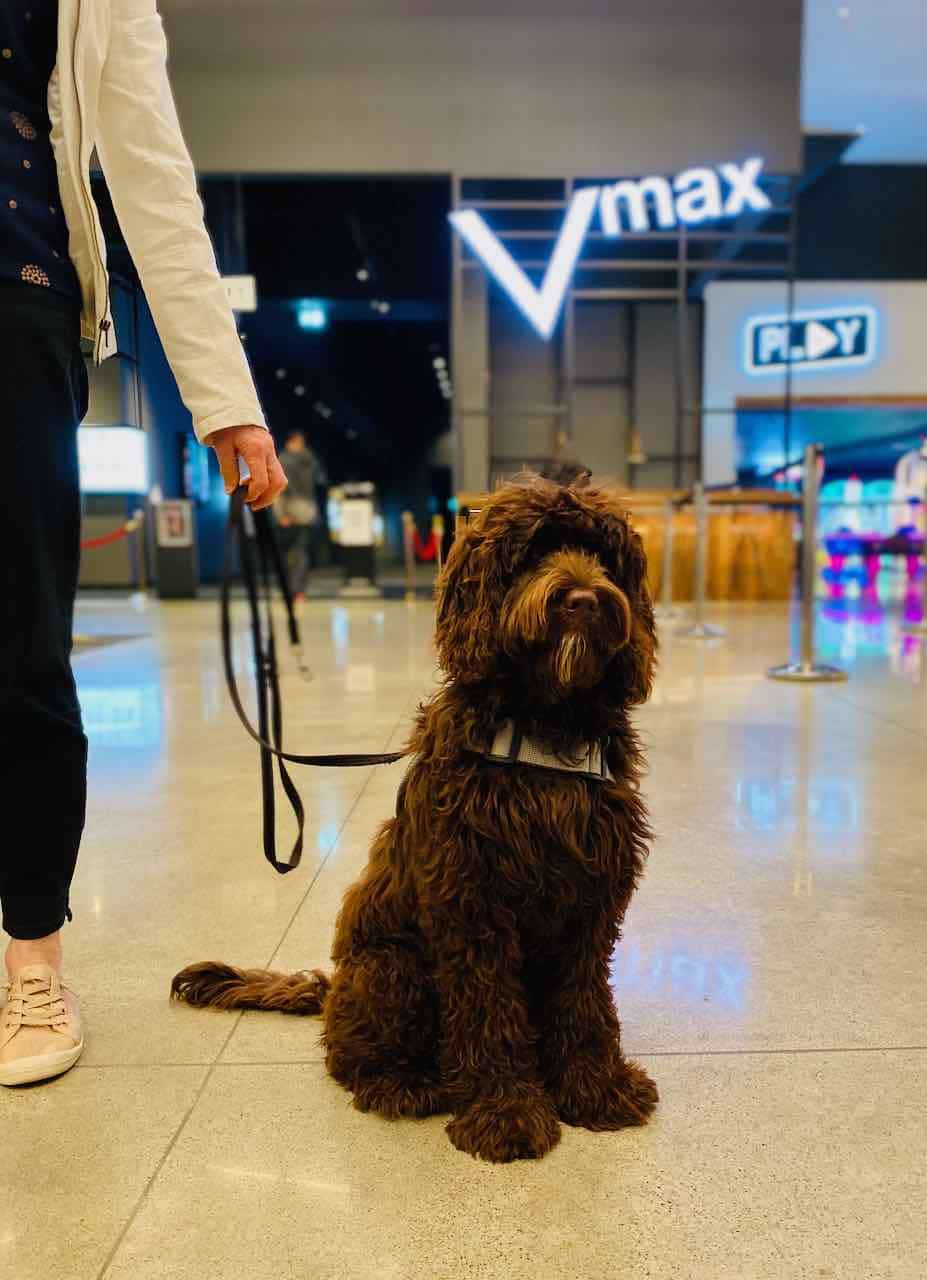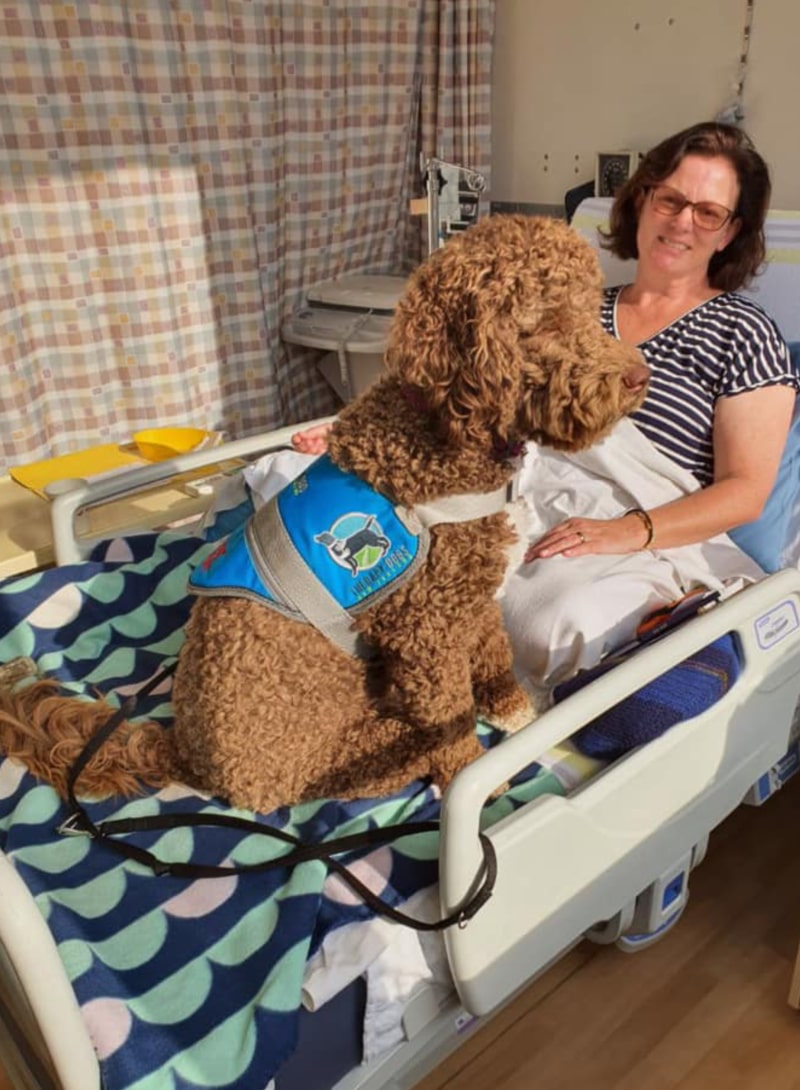OUR PUPS
Breeding & TrainingOUR PUPPIES
We love training Labradoodle puppies to become therapy dogs!

They have proven therapy-natured genetics and a temperament that easily lends itself to all types of therapy roles.
Many of our therapy dogs come from Australian Labradoodle lines and they have many wonderful attributes that you will just adore.
They can be goofy, fun and playful or quiet, still and cuddly. They are also highly intelligent and trainable suiting almost all family situations.
These puppies have low to non-shedding coats/fleece which makes them allergy-friendly.
Please note that we do not accredit, train, or register personal pets to be therapy dogs.

Loving & Affectionate
Personalities

Family Friendly
Temperaments

Asthma & Allergy
Friendly Coats
Healthy Therapy Dogs Are
Our Top Priority
In order for our therapy dogs to look after you, they need to be in tip top shape. That means we take great care in selecting our breeders and checking our puppies for health conditions before and during their therapy dog training.
We do not train personal pets as therapy dogs.
01. Our Breeders
Therapy Dogs New Zealand source and buy therapy puppies from recognised breeders that are affiliated and registered with the Australian Labradoodle Association (ALA), or from New Zealand breeders that adhere to the ALA guidelines.
This ensures that our labradoodle breeders follow strict specific guidelines and ethics around breeding and rearing puppies.
02. Health Checks
We only source the healthiest puppies. Breeding stock are DNA tested, hip and elbow x-rayed and scored, and ophthalmic eye screened for any inherited conditions before they enter the breeding programme.
This extensive health testing ensures we have done all that is possible to protect your family from investing in a therapy dog with an inherited condition.
03. Managing Unexpected Conditions
Even with the best protocols and health testing, an inherited condition can sometimes arise in a litter due to genetics from past generations or genetic anomalies. Additionally, some environmental factors like poor nutrition or too much unrestricted exercise while the young puppy’s joints are developing can sometimes lead to health issues.
We are here to help you navigate any unexpected issue to ensure you get the most out of your therapy dog.
04. Health Guidance
We give you all the information you need to make sure your therapy dog remains healthy and happy when it comes to live with you.
On handover of your therapy pup you will receive a puppy manual as well as hands-on training.
01. Our Breeders
Therapy Dogs New Zealand source and buy therapy puppies from recognised breeders that are affiliated and registered with the Australian Labradoodle Association (ALA), or from New Zealand breeders that adhere to the ALA guidelines.
This ensures that our labradoodle breeders follow strict specific guidelines and ethics around breeding and rearing puppies.
02. Health Checks
We only source the healthiest puppies. Breeding stock are DNA tested, hip and elbow x-rayed and scored, and ophthalmic eye screened for any inherited conditions before they enter the breeding programme.
This extensive health testing ensures we have done all that is possible to protect your family from investing in a therapy dog with an inherited condition.
03. Managing Unexpected Conditions
Even with the best protocols and health testing, an inherited condition can sometimes arise in a litter due to genetics from past generations or genetic anomalies. Additionally, some environmental factors like poor nutrition or too much unrestricted exercise while the young puppy’s joints are developing can sometimes lead to health issues.
We are here to help you navigate any unexpected issue to ensure you get the most out of your therapy dog.
04. Health Guidance
We give you all the information you need to make sure your therapy dog remains healthy and happy when it comes to live with you.
On handover of your therapy pup you will receive a puppy manual as well as hands-on training.
Our Therapy Dogs
Training Process
Each puppy will receive 4 months of intensive socialisation and individualised training until they are reliable and confident in a range of situations and environments.
Wait Times
It currently takes around 16 months for a therapy dog to be placed with their new handler once an application has been successful. However from time-to-time we may have puppies that are not allocated to clients. These puppies would already be in training and may be available sooner.
Frequently Asked Questions
Can you train my dog as a therapy dog?
No. Our therapy dogs are bred specifically for their role to ensure they have the right temperament. This means we do not train other dog breeds or personal family pets to become therapy dogs.
Are therapy dogs the same as service dogs?
Can a therapy dog go to public places?
Therapy Dogs New Zealand is planning to apply for access rights for clients that require their therapy dog to accompany them into restricted situations especially in the case of children with ASD or people with PTSD.
Is a therapy dog suitable for every family?
Is A Therapy Dog a Big Commentment?
Do Therapy Dog Applications Ever Get Declined?
We may also decline a therapy dog application if the person applying for a therapy dog is unable to manage the full care of the dog independently, and has no alternative support system in place to ensure the dog’s needs are always met.
